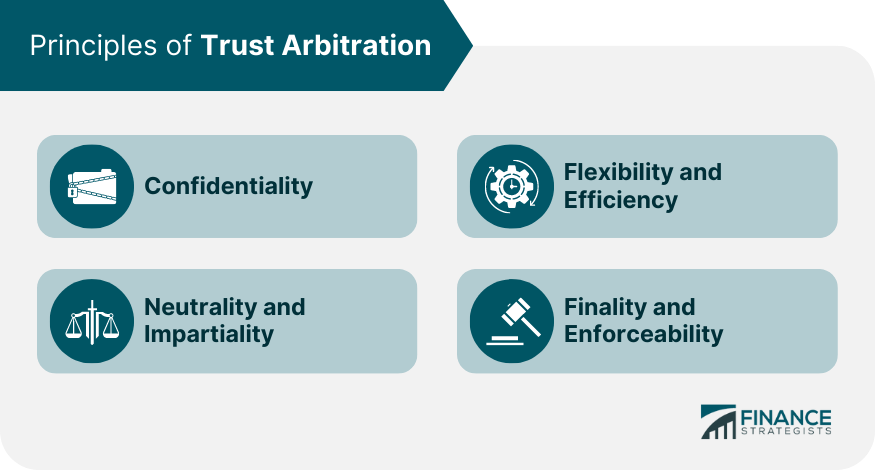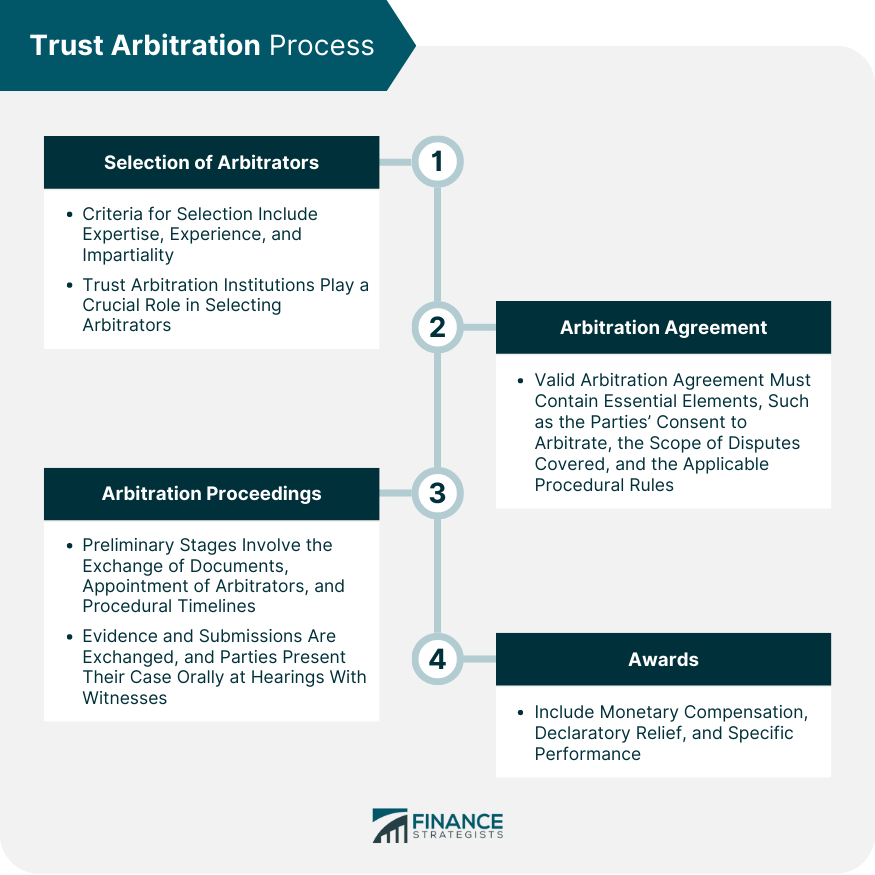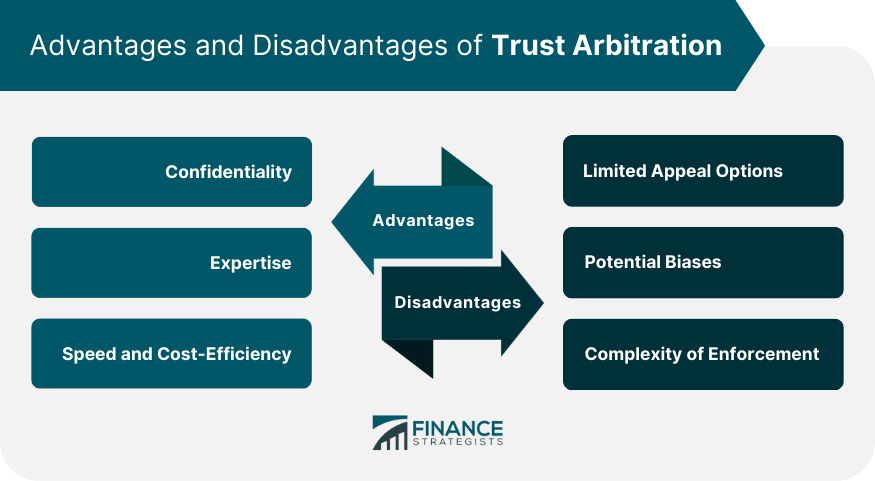Trust arbitration is a method of resolving trust-related disputes through a neutral third party, the arbitrator. It offers an efficient and confidential approach, avoiding costly court proceedings. Trust arbitration is flexible, specialized, and time-efficient, preserving relationships and maintaining confidentiality. Key elements include arbitrator selection, the arbitration agreement, proceedings, and award issuance, ensuring a fair and enforceable outcome. The evolution of trust arbitration can be traced back to the growth of international trade and the increasing complexity of trust-related disputes. Over time, trust arbitration has evolved to become a preferred method of dispute resolution, with the development of specialized institutions and the adoption of legal frameworks to support the process. Trust arbitration is supported by various legal foundations and international treaties, such as the New York Convention of 1958, which provides for the recognition and enforcement of arbitral awards. National laws and regional agreements also contribute to the legal framework, ensuring that trust arbitration operates within a well-regulated environment. One of the core principles of trust arbitration is confidentiality, which helps protect sensitive information and maintain privacy. This principle allows parties to discuss issues openly and honestly, fostering a more effective resolution process and preserving relationships. Trust arbitration ensures neutrality and impartiality by requiring arbitrators to be independent and unbiased. This principle helps establish an environment of fairness and trust, allowing parties to feel confident in the integrity of the decision-making process. The flexibility and efficiency of trust arbitration are key principles that make it an attractive alternative to traditional litigation. The process allows parties to tailor the proceedings to their specific needs, saving time and resources by focusing on the most relevant issues. Trust arbitration awards are generally final and enforceable, providing parties with a sense of closure and certainty. This principle encourages compliance with the arbitrator's decision and helps maintain the credibility of the process. The selection of arbitrators in trust arbitration is based on criteria such as expertise, experience, and impartiality. Parties may agree on specific qualifications or attributes, ensuring that the arbitrator has the necessary skills and knowledge to effectively resolve the dispute. Trust arbitration institutions play a crucial role in the selection of arbitrators, often providing lists of qualified professionals and administering the appointment process. These institutions ensure that the selection process is transparent, fair, and efficient. A valid arbitration agreement must contain essential elements such as the parties' consent to arbitrate, the scope of disputes covered, and the applicable procedural rules. These elements help define the framework of the arbitration process, ensuring that both parties understand their rights and obligations. The scope of disputes covered in a trust arbitration agreement can vary, depending on the parties' preferences and the nature of the trust. It is essential to clearly outline the types of disputes subject to arbitration to avoid confusion and ensure a smooth resolution process. The preliminary stages of trust arbitration proceedings involve the exchange of initial documents, the appointment of arbitrators, and the establishment of procedural timelines. During this phase, parties define the scope of the dispute, set forth their claims and defenses, and agree on the procedural rules that will govern the arbitration process. This initial stage is crucial for laying the foundation for a fair and efficient resolution of the trust dispute. The exchange of evidence and submissions in trust arbitration is a crucial phase that allows parties to present their case and support their arguments. This process involves submitting written statements, documentary evidence, and expert reports, enabling the arbitrator to understand the facts and legal issues at stake. Hearings and testimonies provide an opportunity for parties to present their case orally and examine witnesses in trust arbitration. This stage allows the arbitrator to assess the credibility of the evidence and the arguments presented, helping them make a well-informed decision. In trust arbitration, there are various types of awards, including monetary compensation, declaratory relief, and specific performance. The type of award depends on the nature of the dispute, the parties preferences, and the arbitrator's assessment of the appropriate remedy. Enforcement and challenges in trust arbitration involve recognizing and executing the arbitral award or contesting it on specific grounds. While the New York Convention facilitates enforcement, challenges may arise due to non-compliance with procedural rules, public policy concerns, or the arbitrator's jurisdiction. Confidentiality is a significant benefit of trust arbitration, allowing parties to protect sensitive information and maintain privacy. This feature is particularly important in trust disputes, where disclosure of personal or financial information could have reputational consequences or negatively impact relationships. Trust arbitration allows parties to select arbitrators with specific expertise in trust law, ensuring that the dispute is resolved by professionals with relevant knowledge and experience. This benefit can lead to a more accurate and fair outcome, as the arbitrator is better equipped to understand the intricacies of the case. Trust arbitration offers a faster and more cost-efficient alternative to traditional litigation. The process is streamlined and flexible, allowing parties to save time and resources by avoiding lengthy court proceedings and focusing on the most relevant issues. One drawback of trust arbitration is the limited appeal options available to parties. Unlike court judgments, arbitral awards are generally final and binding, which may be a disadvantage if a party believes that the arbitrator has made an error in their decision. Trust arbitration may be subject to potential biases, as parties often have the power to influence the selection of the arbitrator. While institutions and procedural rules aim to minimize the risk of bias, there is still a possibility that an arbitrator's impartiality could be compromised. Enforcing trust arbitration awards can be complex, particularly in cross-border disputes. While the New York Convention facilitates enforcement, parties may still encounter challenges due to differences in national laws, jurisdictional issues, or public policy considerations. Trust arbitration is increasingly utilized in the banking and finance industry to resolve disputes involving trust structures, financial transactions, and investment management. The specialized knowledge and expertise of arbitrators in this field can lead to more accurate and efficient resolutions while maintaining confidentiality and safeguarding sensitive financial information. In the intellectual property (IP) sector, trust arbitration can be employed to resolve disputes related to IP licensing, technology transfer, and other trust-related arrangements. The process allows parties to select arbitrators with specific IP expertise, ensuring that the dispute is resolved by professionals who understand the nuances of IP law and the related trust arrangements. Trust arbitration is also applicable in real estate and construction disputes, such as those involving trust-owned properties or construction projects financed through trusts. The process enables parties to resolve disputes efficiently while avoiding lengthy court proceedings, which can be particularly beneficial for complex construction projects with tight deadlines. The technology and e-commerce sectors can also benefit from trust arbitration, especially when disputes involve technology trusts or online platforms that operate under trust structures. Arbitrators with expertise in technology law and e-commerce can help resolve disputes effectively, protecting the interests of all parties involved. Trust arbitration is a valuable alternative to traditional litigation for resolving disputes related to trusts. It offers a flexible, efficient, and confidential approach to conflict resolution, allowing parties to tailor the process to their specific needs while saving time and resources. Trust arbitration institutions and legal frameworks support this process, ensuring that it operates within a well-regulated environment. The key principles of trust arbitration, including confidentiality, neutrality, flexibility, finality, and enforceability, contribute to a fair and impartial outcome. While trust arbitration has advantages such as expertise, confidentiality, and cost-efficiency, it also has disadvantages, including limited appeal options, potential biases, and complexity of enforcement. Trust arbitration is becoming increasingly prevalent in specific industries such as banking and finance, intellectual property, real estate and construction, and technology and e-commerce, demonstrating its broad applicability across diverse sectors. Taking control of your financial future and ensuring your loved ones are protected is a crucial responsibility. Estate planning is a complex process that requires expert guidance, particularly when it comes to trust creation and management.What Is Trust Arbitration?
Historical Context of Trust Arbitration
Evolution of Trust Arbitration
Legal Foundations and International Treaties
Principles of Trust Arbitration

Confidentiality
Neutrality and Impartiality
Flexibility and Efficiency
Finality and Enforceability
Trust Arbitration Process
Selection of Arbitrators
Criteria for Selection
Role of Trust Arbitration Institutions
Arbitration Agreement
Elements of a Valid Agreement
Scope of Disputes Covered
Arbitration Proceedings
Preliminary Stages
Exchange of Evidence and Submissions
Hearings and Testimonies
Awards
Types of Awards
Enforcement and Challenges

Advantages of Trust Arbitration
Confidentiality
Expertise
Speed and Cost-Efficiency
Disadvantages of Trust Arbitration
Limited Appeal Options
Potential Biases
Complexity of Enforcement

Trust Arbitration in Specific Industries
Banking and Finance
Intellectual Property
Real Estate and Construction
Technology and E-commerce
Final Thoughts
Trust Arbitration FAQs
Trust arbitration is a form of alternative dispute resolution used to resolve disputes related to trusts. It involves a neutral third party, the arbitrator, who decides the outcome based on evidence and legal principles.
The benefits of trust arbitration include confidentiality, expertise, speed and cost-efficiency, and flexibility. It offers a faster and more cost-effective alternative to traditional litigation, tailored to the specific needs of the parties involved.
The principles of trust arbitration include confidentiality, neutrality and impartiality, flexibility and efficiency, and finality and enforceability. These principles ensure a fair and impartial outcome, protecting sensitive information, and allowing parties to save time and resources.
Limitations of trust arbitration include limited appeal options, potential biases, and complexity of enforcement. Unlike court judgments, arbitral awards are generally final and binding, which may be a disadvantage if a party believes that the arbitrator has made an error in their decision.
Arbitrators in trust arbitration are selected based on criteria such as expertise, experience, and impartiality. Trust arbitration institutions play a crucial role in the selection of arbitrators, often providing lists of qualified professionals and administering the appointment process. These institutions ensure that the selection process is transparent, fair, and efficient. Parties may also agree on specific qualifications or attributes, ensuring that the arbitrator has the necessary skills and knowledge to effectively resolve the dispute.
True Tamplin is a published author, public speaker, CEO of UpDigital, and founder of Finance Strategists.
True is a Certified Educator in Personal Finance (CEPF®), author of The Handy Financial Ratios Guide, a member of the Society for Advancing Business Editing and Writing, contributes to his financial education site, Finance Strategists, and has spoken to various financial communities such as the CFA Institute, as well as university students like his Alma mater, Biola University, where he received a bachelor of science in business and data analytics.
To learn more about True, visit his personal website or view his author profiles on Amazon, Nasdaq and Forbes.















